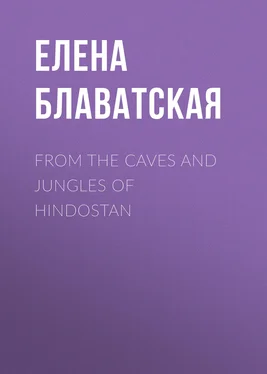Елена Блаватская - From the Caves and Jungles of Hindostan
Здесь есть возможность читать онлайн «Елена Блаватская - From the Caves and Jungles of Hindostan» — ознакомительный отрывок электронной книги совершенно бесплатно, а после прочтения отрывка купить полную версию. В некоторых случаях можно слушать аудио, скачать через торрент в формате fb2 и присутствует краткое содержание. Жанр: Путешествия и география, История, foreign_edu, foreign_antique, foreign_prose, на английском языке. Описание произведения, (предисловие) а так же отзывы посетителей доступны на портале библиотеки ЛибКат.
- Название:From the Caves and Jungles of Hindostan
- Автор:
- Жанр:
- Год:неизвестен
- ISBN:нет данных
- Рейтинг книги:5 / 5. Голосов: 1
-
Избранное:Добавить в избранное
- Отзывы:
-
Ваша оценка:
- 100
- 1
- 2
- 3
- 4
- 5
From the Caves and Jungles of Hindostan: краткое содержание, описание и аннотация
Предлагаем к чтению аннотацию, описание, краткое содержание или предисловие (зависит от того, что написал сам автор книги «From the Caves and Jungles of Hindostan»). Если вы не нашли необходимую информацию о книге — напишите в комментариях, мы постараемся отыскать её.
From the Caves and Jungles of Hindostan — читать онлайн ознакомительный отрывок
Ниже представлен текст книги, разбитый по страницам. Система сохранения места последней прочитанной страницы, позволяет с удобством читать онлайн бесплатно книгу «From the Caves and Jungles of Hindostan», без необходимости каждый раз заново искать на чём Вы остановились. Поставьте закладку, и сможете в любой момент перейти на страницу, на которой закончили чтение.
Интервал:
Закладка:
The deafening caw of the crows strikes every new comer as uncanny, but, after a while, is explained very simply. Every tree of the numerous cocoa-nut forests round Bombay is provided with a hollow pumpkin. The sap of the tree drops into it and, after fermenting, becomes a most intoxicating beverage, known in Bombay under the name of toddy. The naked toddy wallahs, generally half-caste Portuguese, modestly adorned with a single coral necklace, fetch this beverage twice a day, climbing the hundred and fifty feet high trunks like squirrels. The crows mostly build their nests on the tops of the cocoa-nut palms and drink incessantly out of the open pumpkins. The result of this is the chronic intoxication of the birds. As soon as we went out in the garden of our new habitation, flocks of crows came down heavily from every tree. The noise they make whilst jumping about everywhere is indescribable. There seemed to be something positively human in the positions of the slyly bent heads of the drunken birds, and a fiendish light shone in their eyes while they were examining us from foot to head.
We occupied three small bungalows, lost, like nests, in the garden, their roofs literally smothered in roses blossoming on bushes twenty feet high, and their windows covered only with muslin, instead of the usual panes of glass. The bungalows were situated in the native part of the town, so that we were transported, all at once, into the real India. We were living in India, unlike English people, who are only surrounded by India at a certain distance. We were enabled to study her character and customs, her religion, superstitions and rites, to learn her legends, in fact, to live among Hindus.
Everything in India, this land of the elephant and the poisonous cobra, of the tiger and the unsuccessful English missionary, is original and strange. Everything seems unusual, unexpected, and striking, even to one who has travelled in Turkey, Egypt, Damascus, and Palestine. In these tropical regions the conditions of nature are so various that all the forms of the animal and vegetable kingdoms must radically differ from what we are used to in Europe. Look, for instance, at those women on their way to a well through a garden, which is private and at the same time open to anyone, because somebody's cows are grazing in it. To whom does it not happen to meet with women, to see cows, and admire a garden? Doubtless these are among the commonest of all things. But a single attentive glance will suffice to show you the difference that exists between the same objects in Europe and in India. Nowhere more than in India does a human being feel his weakness and insignificance. The majesty of the tropical growth is such that our highest trees would look dwarfed compared with banyans and especially with palms. A European cow, mistaking, at first sight, her Indian sister for a calf, would deny the existence of any kinship between them, as neither the mouse-coloured wool, nor the straight goat-like horns, nor the humped back of the latter would permit her to make such an error. As to the women, each of them would make any artist feel enthusiastic about the gracefulness of her movements and drapery, but still, no pink and white, stout Anna Ivanovna would condescend to greet her. "Such a shame, God forgive me, the woman is entirely naked!"
This opinion of the modern Russian woman is nothing but the echo of what was said in 1470 by a distinguished Russian traveler, "the sinful slave of God, Athanasius son of Nikita from Tver," as he styles himself. He describes India as follows: "This is the land of India. Its people are naked, never cover their heads, and wear their hair braided. Women have babies every year. Men and women are black. Their prince wears a veil round his head and wraps another veil round his legs. The noblemen wear a veil on one shoulder, and the noblewomen on the shoulders and round the loins, but everyone is barefooted. The women walk about with their hair spread and their breasts naked. The children, boys and girls, never cover their shame until they are seven years old...." This description is quite correct, but Athanasius Nikita's son is right only concerning the lowest and poorest classes. These really do "walk about" covered only with a veil, which often is so poor that, in fact, it is nothing but a rag. But still, even the poorest woman is clad in a piece of muslin at least ten yards long. One end serves as a sort of short petticoat, and the other covers the head and shoulders when out in the street, though the faces are always uncovered. The hair is erected into a kind of Greek chignon. The legs up to the knees, the arms, and the waist are never covered. There is not a single respectable woman who would consent to put on a pair of shoes. Shoes are the attribute and the prerogative of disreputable women. When, some time ago, the wife of the Madras governor thought of passing a law that should induce native women to cover their breasts, the place was actually threatened with a revolution. A kind of jacket is worn only by dancing girls. The Government recognized that it would be unreasonable to irritate women, who, very often, are more dangerous than their husbands and brothers, and the custom, based on the law of Manu, and sanctified by three thousand years' observance, remained unchanged.
For more than two years before we left America we were in constant correspondence with a certain learned Brahman, whose glory is great at present (1879) all over India. We came to India to study, under his guidance, the ancient country of Aryas, the Vedas, and their difficult language. His name is Dayanand Saraswati Swami. Swami is the name of the learned anchorites who are initiated into many mysteries unattainable by common mortals. They are monks who never marry, but are quite different from other mendicant brotherhoods, the so-called Sannyasi and Hossein. This Pandit is considered the greatest Sanskritist of modern India and is an absolute enigma to everyone. It is only five years since he appeared on the arena of great reforms, but till then, he lived, entirely secluded, in a jungle, like the ancient gymnosophists mentioned by the Greek and Latin authors. At this time he was studying the chief philosophical systems of the "Aryavartta" and the occult meaning of the Vedas with the help of mystics and anchorites. All Hindus believe that on the Bhadrinath Mountains (22,000 feet above the level of the sea) there exist spacious caves, inhabited, now for many thousand years, by these anchorites. Bhadrinath is situated in the north of Hindustan on the river Bishegunj, and is celebrated for its temple of Vishnu right in the heart of the town. Inside the temple there are hot mineral springs, visited yearly by about fifty thousand pilgrims, who come to be purified by them.
From the first day of his appearance Dayanand Saraswati produced an immense impression and got the surname of the "Luther of India." Wandering from one town to another, today in the South, tomorrow in the North, and transporting himself from one end of the country to another with incredible quickness, he has visited every part of India, from Cape Comorin to the Himalayas, and from Calcutta to Bombay. He preaches the One Deity and, "Vedas in hand," proves that in the ancient writings there was not a word that could justify polytheism. Thundering against idol worship, the great orator fights with all his might against caste, infant marriages, and superstitions. Chastising all the evils grafted on India by centuries of casuistry and false interpretation of the Vedas, he blames for them the Brahmans, who, as he openly says before masses of people, are alone guilty of the humiliation of their country, once great and independent, now fallen and enslaved. And yet Great Britain has in him not an enemy, but rather an ally. He says openly—"If you expel the English, then, no later than tomorrow, you and I and everyone who rises against idol worship will have our throats cut like mere sheep. The Mussulmans are stronger than the idol worshippers; but these last are stronger than we." The Pandit held many a warm dispute with the Brah-mans, those treacherous enemies of the people, and has almost always been victorious. In Benares secret assassins were hired to slay him, but the attempt did not succeed. In a small town of Bengal, where he treated fetishism with more than his usual severity, some fanatic threw on his naked feet a huge cobra. There are two snakes deified by the Brahman mythology: the one which surrounds the neck of Shiva on his idols is called Vasuki; the other, Ananta, forms the couch of Vishnu. So the worshipper of Shiva, feeling sure that his cobra, trained purposely for the mysteries of a Shivaite pagoda, would at once make an end of the offender's life, triumphantly exclaimed, "Let the god Vasuki himself show which of us is right!"
Читать дальшеИнтервал:
Закладка:
Похожие книги на «From the Caves and Jungles of Hindostan»
Представляем Вашему вниманию похожие книги на «From the Caves and Jungles of Hindostan» списком для выбора. Мы отобрали схожую по названию и смыслу литературу в надежде предоставить читателям больше вариантов отыскать новые, интересные, ещё непрочитанные произведения.
Обсуждение, отзывы о книге «From the Caves and Jungles of Hindostan» и просто собственные мнения читателей. Оставьте ваши комментарии, напишите, что Вы думаете о произведении, его смысле или главных героях. Укажите что конкретно понравилось, а что нет, и почему Вы так считаете.












